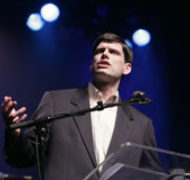Serving God in the Family “Business”: A Candid Interview with William Franklin Graham IV
Blog / Produced by The High Calling
At The High Calling, we don't often address the unique vocational, relational, and spiritual challenges of working for a Christian non-profit organization. So we couldn’t pass up the opportunity to interview William Franklin Graham IV, the grandson of evangelist Billy Graham and the son of Billy Graham Evangelistic Association (BGEA) President and CEO Franklin Graham. Now an associate evangelist with BGEA and Assistant Director of the Billy Graham Training Center at The Cove in Asheville, North Carolina, Will has a lifetime's worth of exposure to these challenges. He talked to Leadership editor Christine A. Scheller about how he, his famous family, and BGEA deal with them.
The High Calling: People often idealize working for a Christian organization. Are we wrong to expect a Christian workplace to be different?
Will Graham: When we hire people, one of the things that we really try to listen for is if whether or not they feel called to ministry with our organization. We've gotten a lot of resumes from qualified people, but if they're not called, ultimately, they're not going to fit. They may be wonderful Christian people, but they’re not who we're looking for.
BGEA has some of the best employees; we really do. But at the same time, we're all human, and we all have bad days. When there is an issue, we'll sit down and pray about it. Employees will get together and pray about it. Sometimes it still doesn't work out. We may have to move people to a different department because their gifts aren't being used—maybe we put them in a bad spot that doesn’t meet their strengths. On the other hand, we have some great administrators who have helped us in this area. My dad is a wonderful administrator. My granddaddy hired George Wilson, who really kind of shaped the Billy Graham organization administration-wise when it first was founded.
As a staff, every morning we start off in devotions, looking into God's Word together, praying together for the needs of the ministry. We pray for one another. BGEA is a wonderful place to work, and I’m blessed to be a part of it. It's tough working for family, but we do it because we love each other.
What advice do you have for people dealing with challenges in the workplace?
Never think the grass is greener somewhere else. Every place is going to have issues, so don’t run. Deal with it. You'll learn from it. Then, pray that God changes you. Don't pray only for the other person to change. Instead pray, "Lord, show me what I need to change. Change me first." And always pray that God will be glorified through the situation. I think it's great when people do have conflict, and at the end, they hug each other and say, "God got what he wanted through this."
What has BGEA been really good at as an organization?
BGEA and Samaritan’s Purse are two separate organizations, and I’ve had the privilege of working at both of them. I'm going to speak of Samaritan's Purse and BGEA in the same way, but I’ve actually worked at Samaritan’s Purse longer than BGEA.
Both organizations have always had strong leadership. Samaritan’s Purse was founded by Bob Pierce, who also founded World Vision. Billy Graham, the founder of BGEA, is still speaking into things. It’s rare to have someone heading up the same organization for 60 years. Even though my father calls the shots, when my granddaddy speaks, my dad listens. We've been blessed with strong leadership mainly because of tenure. That's something you can't manufacture. We've just been blessed with it.
In what other areas has the organization excelled?
Both my dad and my granddaddy are the same men you see on TV. They’re transparent. That's been one of the hallmarks for BGEA and Samaritan's Purse. We disclose everything. We don't go around and blow a trumpet when something goes wrong, but we're transparent.
In what areas has the organization been less successful?
I can speak to that on a personal level. There's a lot of heartache in our family, and my granddaddy has always taken that upon himself. I think my granddaddy would look back and say, "I wish I'd taken less speaking engagements, and spent more time in prayer and more time studying God's Word."
It's weird, because every time I go to his house, he's doing one of three things: He's either praying, reading God's Word, or watching Larry King Live. Larry's gone now. So, maybe the TV is less. When he says, "I wish I'd spent more time in prayer or in God's Word," for a grandson, that's a big learned lesson.
When your grandfather retired from active ministry was the transition as rocky as it would be for any organization?
Yes. At the 1995 Toronto crusade, my granddaddy collapsed with a bleeding ulcer and was taken to the hospital. He was going to be fine, but he couldn’t preach. My granddaddy called my dad and said, "I want you to come up here." At that point, there wasn’t a backup plan. God gave him supernatural strength, and Billy had always preached.
The staff didn't know what to do, so they got another one of our evangelists to preach. Afterwards, the board said Franklin Graham is now going to be the number two man. After a few years, my granddaddy said, “I’m retiring as the CEO. I'm going to turn the reins of the day-to-day operation over to my son, Franklin." Some people didn't agree with that or like it, but a lot of people did.
How have you and your father dealt with charges of nepotism? Is that a spiritual challenge?
It is. But, for us, it's not a business; it’s a ministry. It's not ours to inherit. The board prayed about this and said, "We believe it's for Franklin now to run; we believe God is leading us this way," and put my dad in charge. My dad never asked for it. I'm friends with so many of the staff and as long as I carry my weight, I don't think they care.
Do you feel like you have to work harder to prove yourself?
Not to prove myself to the staff. I work for my dad. He'll call me up. He's got my cell phone number. "Where are you? What you doing?" So, I've got high accountability. My dad will be the first one to chew me out if I need him to. My dad has always been tougher on us kids.
What kind of issues did you deal with personally, vocationally, and spiritually when you decided to go to work for BGEA?
I went very reluctantly into this ministry. I always felt like I was called to ministry. Looking back, second grade is probably the first time I realized God was putting a burden in my heart for ministry. All the way through high school, God kept confirming that same calling, but I didn't know what it was going to be.
When I was about 15 years old, I got on my knees and said, "Lord, whatever you want me to do, I'll do it." I still didn't know what, but that was total surrender, in a sense. I went to Liberty University after high school and was being prepared, but still didn't know what it was. I thought I was going to help my father with Samaritan's Purse.
Did you work with him as you were growing up?
I did. I like to joke that my dad didn't understand the child labor laws. So, it was kind of forced labor, doing odd jobs. It was mainly non-ministry-related jobs, pulling weeds—I don't know how many weeds I pulled. I worked for six months in a ministry-related position between college and my graduate work. Then I went to a Southeastern Baptist Theological Seminary, though I was not a Southern Baptist at the time.
I never wanted to be a pastor, but I became pastor of a Southern Baptist church while I was in seminary. I always tell people God tricked me, because I think if he showed me the whole thing, I would have been like Jonah and would have run the other way. God slowly brought me into ministry as a pastor. I ended up loving it. Eventually God called me to help my dad, and my dad determined that he wanted me at BGEA. I was real excited about that, but I hated to leave because I loved my local church.
Growing up, my dad protected us from the ministry side of things. No one from BGEA was allowed to talk to us about ministry. Dad said, "You're not going to push this on Will. Don't go ask him to do something just because he's my son. If you want to talk to Will, you have to come to me first."
Sometime in college, Dad said, "All right, Will is his own man. He can make those decisions now." He always protected us because he felt like he was thrown into it as a young child, not because of his parents, but because other people expected it. When my dad was born, people said, "Congratulations to Billy, Jr." That's what they called my dad. "Billy Jr., you've got some big shoes to fill." My dad never appreciated that.
What challenges from your pastoral experience prepared you to work for BGEA?
I'm not sure if I can answer that question fully because I'm still learning things that God was teaching me in the pastorate. One of the biggest lessons came when some of the leadership and I hit heads. We weren't planning on it. We just had some differences and part of me said, “I don't need this headache. I can go work for my dad. I can actually have a weekend off,” because I was working seven days a week.
My granddaddy had taught me that oftentimes people want the mountaintops. You know, all the good things in our lives, like our weddings. No one talks about when you and your spouse fight, when finances are low. Those are the valleys. My granddaddy said, "That's where the fruit is." If you think about it, no apple trees are on top of the mountains; they're down in the valleys.
I saw a lot of my friends short-cutting themselves in seminary. They wanted a mountaintop experience; they didn't want to go through the tough trials. I realized that if I am going to be a better preacher, a better man to be used by God, then I need to understand what it means to go through the valleys.
So, you learned perseverance?
It’s not just perseverance, but being obedient to the Lord and remembering what God's called me for. I realized if I was going to build character, then I needed to go through trials in my life. It’s not always going to be easy, but God is right there with me.
Image by the Billy Graham Evangelistic Assocation. Used with permission.





